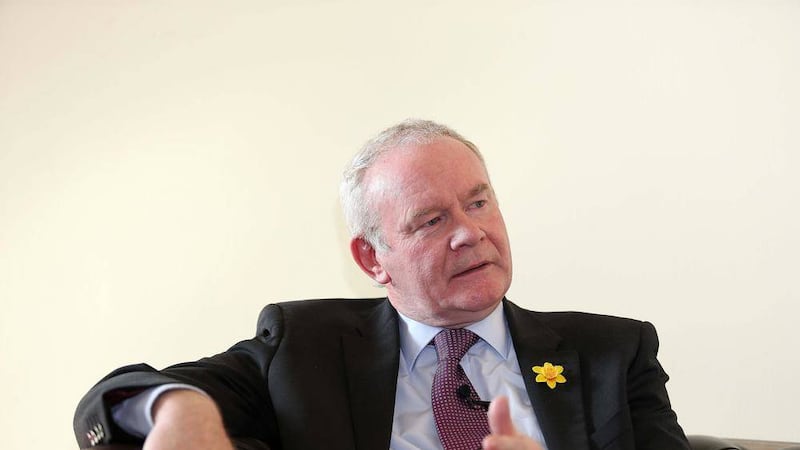DEPUTY First Minister Martin McGuinness has refused to rule out resigning over the welfare impasse, amid warnings from Peter Robinson over the future of the assembly.
The First Minister said yesterday that unless the Stormont House Agreement is implemented there is "no future for the assembly and executive".
If either the first or deputy first minister resigns the Executive would automatically collapse - a move that would prompt either a snap election or a period of suspension and imposition of direct rule from Westminster.
Quizzed about speculation he may step down if London claws back welfare powers, Mr McGuinness said he was on record that such a move would be unacceptable.
"I also made it clear, as a Sinn Féin leader, I have a responsibility to discuss these matters with the national leadership of Sinn Féin, and in that eventuality to put to them my view of what should happen," he said.
"I'm not going to go any further than that at this stage, except to say that we have a problem, it is a serious problem, it is a crisis, it needs to be resolved."
Speaking alongside Mr Robinson at the British-Irish Summit in Dublin, Mr McGuinness refused on two occasions to clearly dismiss speculation about a threatened resignation.
"There has been a lot of speculation over the last couple of days, I'm not responsible for any of it," he said.
But he said he was committed to resolving outstanding difficulties and seeing the implementation of the Stormont House Agreement.
The landmark deal sets a blueprint for dealing with contentious issues including parades, flags, emblems and the past.
However, subsequent disagreement from Sinn Féin and the SDLP over planned welfare reforms have threatened to unravel the entire agreement.
The British Government has said it is considering intervening to implement welfare changes over the head of the assembly but has insisted that step remains a "last resort".
Mr McGuinness said the Stormont House Agreement brings with it a lot of pain but stressed it is "the only way forward".
"I'm in resolution mode. I am a problem solver," he added.
"When you consider what we have come through over the last 20 years and the historic decisions, many of which I've been involved in, then surely we can find a way forward in relation to the present difficulties.
"That's where my efforts are bent."
Mr Robinson said he adopted the same position as both the British and Irish governments - that the agreement must be implemented "in full".
"It is my view that unless the Stormont House Agreement is implemented there is no future for the assembly and executive," he said.
"So it becomes an imperative as far as I'm concerned that within the next few months we can resolve the outstanding issues and move forward as awe agreed last December."
Mr Robinson, recovering from a recent heart attack, said the ongoing impasse was already hitting the public purse, education, investment and the economy.








